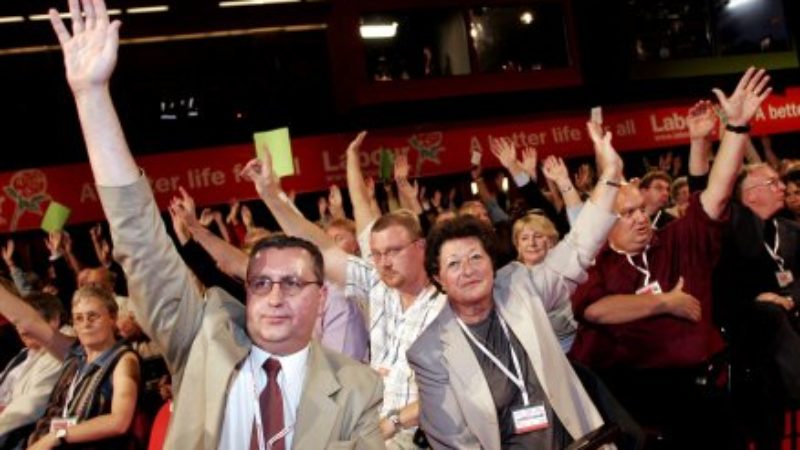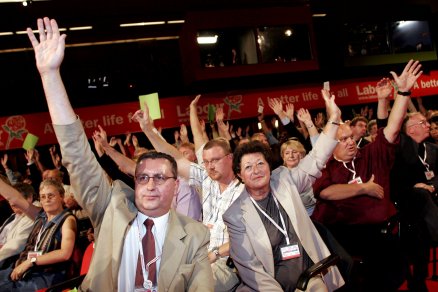
Contrary to popular belief (and by popular belief, I mean the belief that prevails amongst the Shadow Cabinet and its apparatchiks) the Labour Party does not exist as a fan club for the Parliamentary faction. The Labour Party is an instrument through which ordinary people can shape their own lives and change the future of this country in a direction that is beneficial to our people.

The recent decision by the Labour leadership to vote with the Coalition and implement a cap on welfare spending was widely derided by party members and trade unionists as yet another example of the often-reiterated public belief that our politicians are all the same.
Actions such as these are difficult to defend, as are many of the policy announcements that trickle out of Brewers Green. In the pursuit of power the Labour Party has broken away from allowing working people to shape its policies, and instead has relied on think tanks and policy wonks that often have no clue at all as to the needs of the people of Britain. In times of economic strife such as these, I highly doubt the unemployed are particularly bothered that members of the armed forces will be able to board planes quicker under a future Labour government. People want jobs, decent housing, protection from the threat of war and the might of global capital, and freedom to take control of their own lives – not “speedy boarding”.
A recent LabourList survey revealed that 80% of those who took part had no clue at all as to how they could contribute to Labour’s manifesto. And why would they? The National Policy Forum imposes a representative rather than participative form of democracy and merely rubber stamps the policies that are approved by the leaders office.
Conference, which is the supreme sovereign body of the party, has its decisions ignored and rebuked by the Shadow Cabinet who believe, quite wrongly, that they have a veto due to their status as parliamentarians. Conference has time after time voted to bring the railways back into public ownership. Last year’s motion by the CWU to renationalise Royal Mail, popular with both party members and the public, was instantly rejected by Chuka Ummuna. What right does he, as someone claiming to represent the interests of Labour, to outright reject the majoritarian will of the people who’s hard work got him into parliament in the first place?
For all the talk of “Better Politics”, Ed Miliband still appears to support the parachuting of ‘acceptable’ candidates into safe seats. Meanwhile, any attempt to deselect sitting members of parliament who have betrayed the values of our movement is made very difficult. Selections must be reformed. Reselection must be mandatory. Trigger ballots as to whether to support the sitting MP are simply not enough, and a full selection should be held once in the lifetime of a parliament.
We must regain democratic control of our party if we wish to achieve real fundamental change in our society. The National Policy Forum is deeply flawed and should be abolished. The trade unions are by and large in favour of returning to a resolution based Conference – it wouldn’t surprise me if constituency parties hold the same beliefs.
For far too long Conference has become a platform for the leadership to promote PPCs, Shadow Cabinet members and academics. Instead it should be a platform for ordinary people to express their views and for the party to decide its policy. Resolutions passed with a two thirds majority should be binding and included in the manifesto, which should be written not by the Leader but by the National Executive, who represent the views of the entire movement and not just the Parliamentary faction.
The National Executive Committee must be strengthened and returned to its rightful position as the management committee of the party and be able to hold the parliamentary party to account and make sure that they implement the manifesto pledges they were elected on. Party officials must also be made accountable to the membership via the NEC if we are to end the fixing culture that persists within the upper echelons of the party bureaucracy.
Debate and dissent are important parts of our national political tradition, it’s what Labour was born out of. As Michael Foot once said:
“Is the Labour Party to remain a democratic party in which the right of free criticism and free debate is not merely tolerated but encouraged? Or are the rank and file of the party to be bludgeoned or cowed into an uncritical subservience towards the leadership?”
I think we can all agree that what is needed is the former and not the latter.
Max Shanly is a member of the Young Labour National Committee and an executive member of the Campaign for Labour Party Democracy.




More from LabourList
Government announce SEND reform in schools white paper
SPONSORED: ‘Industrial hemp and the challenge of turning Labour’s priorities into practice’
‘A day is a long time in politics, so we need ‘action this day’’